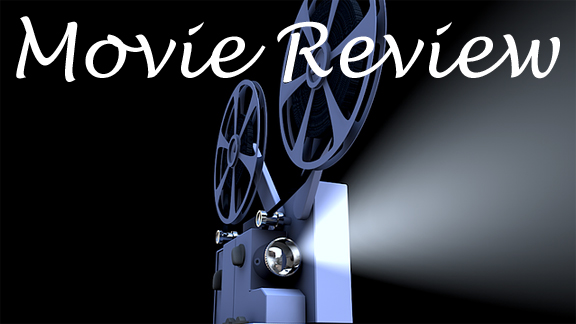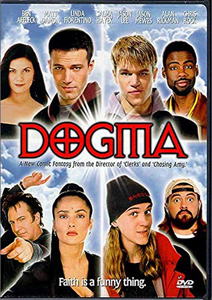I’m in a position to provide two perspectives, two decades apart, on “Dogma” (1999). In a 2001 review, I called “Jay and Silent Bob Strike Back” a return to funny form after the “overwrought” “Dogma.” I didn’t get into writer-director Kevin Smith’s theological epic because I didn’t understand or care about what was going on.
Comedy from complexity
Later, I moved to a smaller town and met a lot of religious people. Although I’m far from knowledgeable about Catholic doctrine, I do understand it’s complex and controversial even within wider theism, and even within wider Christianity.
Along with simply being open to hearing other points of view, that’s enough of a basis for me to appreciate “Dogma” now.

To celebrate Kevin Smith’s birthday, from Aug. 1-9 we’re spotlighting some of his work that we haven’t previously reviewed at Reviews from My Couch.

“Dogma” (1999)
Director: Kevin Smith
Writer: Kevin Smith
Stars: Ben Affleck, Matt Damon, Linda Fiorentino
I can’t go so far as to love it, though. It’s 130 minutes long and doesn’t need to be. There’s time between every “action” and “cut” that could be trimmed. “Dogma” is undeniably more indulgent than any other Smith flick, before or since.
This trait does make it clear how much it means to Smith to find his Catholic faith. A key early scene further cues us in to his wavelength. Protagonist Bethany (Linda Fiorentino) speaks of how she misses the pure belief in God she had as a child. That might be a “duh” moment for theists, but it’s not a feeling atheists are familiar with.
Requires our attention
Smith helps atheists and non-Catholics through the details. But he requires that we pay attention. Catholic doctrine is extremely complex, even more so than the Viewaskewniverse.
But it also begs for a story like “Dogma” to be told. Smith sticks with the Biblical narrative but asks deeper questions. He treats fallen angels Loki (Matt Damon) and Bartleby (Ben Affleck) like … well, not exactly humans, as they operate under a different set of rules … but like thinking and feeling beings.
Smith constantly asks “What would (a given Biblical figure) do in (a given situation on Earth)?” This narrative will inevitably play best with Catholics, but it does work on that second level where it’s simply a grand adventure.
The full troupe
“Dogma” requires a ton of exposition, but – although this is a talky film with only occasional (cheesy) action — Smith makes it accessible. This is partly thanks to the actors – who are, by the time of his fourth film, like a theater troupe.
Chris Rock’s Rufus falls out of the sky and explains that he’s the 13th Apostle. This allows for commentary on how black people are underplayed in the Bible, and how that trickles down to modern times.

“Dogma” cleverly works Jay (Jason Mewes) and Silent Bob (Smith) into the mix, as Bethany assumes they are “prophets” because of some coincidences. But they remain normal guys from the audience’s perspective, and they serve as the story’s Rosencrantz and Guildenstern.
Also featuring classic turns by George Carlin (as a cardinal!) and Alan Rickman (as God’s spokesperson), “Dogma” might be a case of Smith biting off more than he can chew early in his career. But, in retrospect, his passion for the material was at a high point in 1999, and it might not have been later.
Watching it is still like homework to me, and even for viewers steeped in doctrine, it might require an intermission. But two decades later, there’s nothing else like it in Smith’s career or in the wider world of films. I don’t know if God exists, but I’m glad “Dogma” does.

